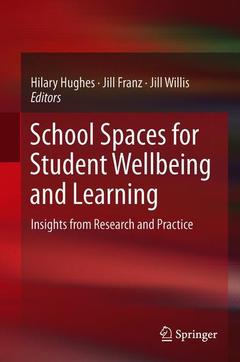School Spaces for Student Wellbeing and Learning, 1st ed. 2019 Insights from Research and Practice
Coordonnateurs : Hughes Hilary, Franz Jill, Willis Jill

This book introduces a new wellbeing dimension to the theory and practice of learning space design for early childhood and school contexts. It highlights vital, yet generally overlooked relationships between the learning environment and student learning and wellbeing, and reveals the potential of participatory, values-based design approaches to create learning spaces that respond to contemporary learners? needs.
Focusing on three main themes it explores conceptual understandings of learning spaces and wellbeing; students? lived experience and needs of learning spaces; and the development of a new theory and its practical application to the design of learning spaces that enhance student wellbeing. It examines these complex and interwoven topics through various theoretical lenses and provides an extensive, current literature review that connects learning environment design and learner wellbeing in a wide range of educational settings from early years to secondary school.
Offering transferable approaches and a new theoretical model of wellbeing as flourishing to support the design of innovative learning environments, this book is of interest to researchers, tertiary educators and students in the education and design fields, as well as school administrators and facility managers, teachers, architects and designers.
Hilary Hughes is an adjunct associate professor at the Faculty of Education, Queensland University of Technology (QUT), Australia. From 2015 to 2018 she taught units in the Master of Education program, including Designing Spaces for Learning. Her research interests include learning space design, information literacy and informed learning, and international student experience. She has been chief investigator for two Australian Research Council (ARC) Linkage projects and has completed several other funded projects. Hilary’s qualifications include a PhD (QUT, Australia), MA in Librarianship (Sheffield University, UK) and BA Combined Honours in Spanish and Romance Linguistics (Birmingham University, UK). In 2010 Hilary was Fulbright Scholar-in-Residence at the University of Colorado Denver, USA.
Jill Franz is a professor at the School of Design, Creative Industries Faculty, Queensland University of Technology, Australia. She has extensive experience in academic departmental administration as well as in professional practice, research and teaching of architectural and interior design. Her research focuses on the environment and its potential to enhance health, wellbeing and social justice. She is chief investigator for an Australian Research Council funded project: Innovative procurement theories to optimise education per cost of school.
Jill Willis is a senior lecturer at the Faculty of Education, Queensland University of Technology, Australia. She teaches in the area of leadership and management studies, enabling school leaders to plan for and lead change. Her research interests focus on learner agency, pedagogy, assessment, and learning spaces. Jill’s research projects include a Queensland Government Horizon Grant exploring with partner schools how participatory evaluation can inform design of new senior assessment responses. Jill’s qualifications include a PhD (QUT, Australia), MEd in Educational Leadership (JCU), Graduate Diploma in Education (BCAE)
Showcases the contemporary research and practice of learning space design for school and early years contexts
Offers a values-based approach to learning space design to enhance student wellbeing and learning
Encompasses formal classroom settings and informal learning spaces, such as playgrounds
Presents a new theoretical model of wellbeing as flourishing to support the creation of inclusive learning environments
Provides exemplars of learning environment esign processes and outcomes to inform design initiatives elsewhere
Enables participatory design that gives voice to school stakeholders, especially students
Date de parution : 03-2019
Ouvrage de 287 p.
15.5x23.5 cm
Thèmes de School Spaces for Student Wellbeing and Learning :
Mots-clés :
Learning Environment Evaluation and Design; Design of School Facilities; Learning Environment Early Years; Learning Environment Primary Schools; Learning Environment Middle Years; Learning Environment Secondary Schools; Student Voice in School Designing; School Spaces that Support Student Wellbeing; Designing Learning Environments for Student Wellbeing; Participatory Designing Process; Values Based Designing; Contemporary Learning Spaces; Interdisciplinary Approaches to Learning Environment Design; School Design Case Studies Australia; Qualitative Research Learning Environments; Evidence Based Designing; Learning Environment Theory; Pedagogy and Learning Environment; Built Pedagogy Theory and Practice; School Fiction in Children’s Literature



